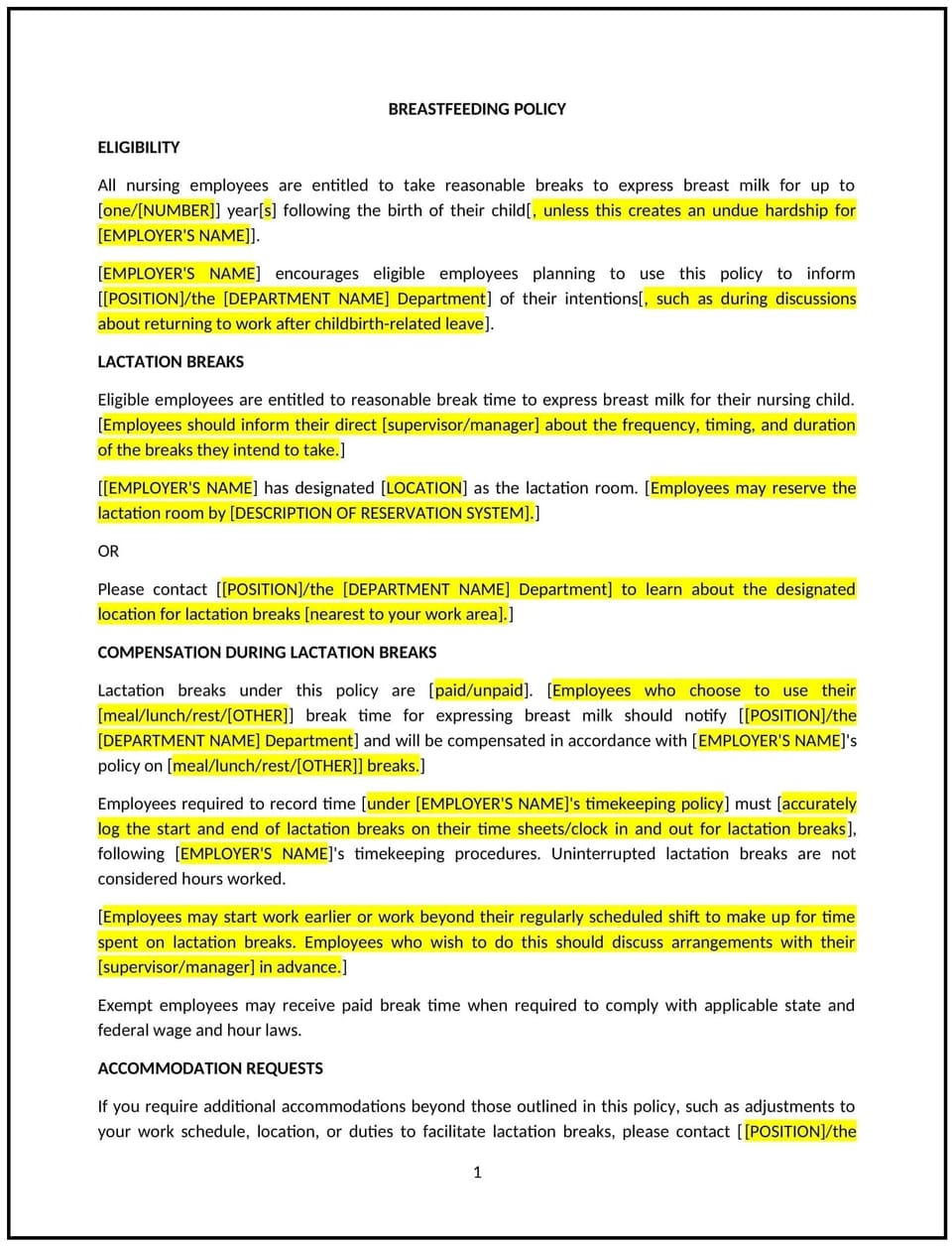Breastfeeding break policy (Louisiana): Free template

Breastfeeding break policy (Louisiana)
This breastfeeding break policy is designed to help Louisiana businesses provide clear guidelines for supporting nursing employees. It outlines the rights and accommodations available for breastfeeding employees, including break times and private spaces, in alignment with Louisiana-specific regulations and best practices.
By implementing this policy, businesses can promote employee well-being, support new parents, and foster a family-friendly workplace culture.
How to use this breastfeeding break policy (Louisiana)
- Define eligibility: Specify which employees are covered under the policy, such as nursing mothers returning to work.
- Outline break entitlements: Detail the frequency and duration of breaks allowed for breastfeeding or expressing milk.
- Provide private space requirements: Clarify that employees will have access to a clean, private, and non-bathroom space for breastfeeding or pumping.
- Address scheduling flexibility: Encourage open communication between employees and supervisors to coordinate breaks without disrupting workflow.
- Include storage considerations: Provide guidelines for safely storing expressed milk, such as access to refrigeration if available.
- Communicate manager responsibilities: Train supervisors on how to implement this policy respectfully and fairly.
Benefits of using a breastfeeding break policy (Louisiana)
Implementing this policy provides several advantages for Louisiana businesses:
- Supports employee health: Helps nursing employees balance work and breastfeeding needs.
- Promotes workplace inclusivity: Creates a family-friendly environment that supports new parents.
- Enhances employee retention: Demonstrates care for employee well-being, fostering loyalty and satisfaction.
- Reduces legal risks: Aligns with Louisiana and federal requirements for breastfeeding accommodations.
- Encourages workplace harmony: Fosters understanding and cooperation between employees and management.
Tips for using this breastfeeding break policy (Louisiana)
- Provide education: Train managers and employees on the importance of breastfeeding accommodations and the specifics of the policy.
- Designate private spaces: Ensure suitable spaces are available for breastfeeding or pumping, separate from restrooms.
- Encourage open communication: Create a supportive atmosphere where employees feel comfortable discussing their needs.
- Offer flexibility: Allow nursing employees to adjust their schedules to balance work and breastfeeding responsibilities effectively.
- Monitor and improve: Regularly review the policy to ensure it continues to meet employee needs and reflects Louisiana-specific guidelines.
Q: Who is eligible for breastfeeding breaks under this policy?
A: Nursing employees returning to work after childbirth are eligible for breaks to breastfeed or express milk.
Q: How long are breastfeeding breaks allowed to be?
A: Break durations may vary depending on the employee’s needs but should be reasonable and sufficient for breastfeeding or expressing milk.
Q: What kind of space must be provided for breastfeeding or pumping?
A: Businesses must provide a private, clean space that is not a bathroom, with access to a comfortable seating area and electrical outlets if needed.
Q: Can breastfeeding breaks overlap with regular breaks?
A: Yes, where possible, breastfeeding breaks may align with existing breaks to minimize disruption.
Q: How should expressed milk be stored?
A: Employees should have access to refrigeration for storing expressed milk or may bring personal coolers for storage if no refrigeration is available.
Q: How often should this policy be reviewed?
A: The policy should be reviewed annually or whenever there are updates to Louisiana or federal breastfeeding accommodation requirements.
Q: What should managers do if they have questions about implementing the policy?
A: Managers should refer to HR or the policy guidelines and seek additional training if necessary to ensure proper implementation.
This article contains general legal information and does not contain legal advice. Cobrief is not a law firm or a substitute for an attorney or law firm. The law is complex and changes often. For legal advice, please ask a lawyer.


